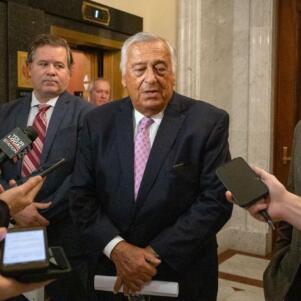Senate approves budget, Keenan questions support for opioid fight
By State House News Service | July 1, 2016, 6:48 EDT
 (Shutterstock)
(Shutterstock) STATE HOUSE — With just hours remaining in the current fiscal year, the state Senate on Thursday evening voted 38-1 to send a fiscal 2017 budget to Gov. Charlie Baker’s desk.
The $39.15 billion budget passed the House earlier in the day on a 150-3 vote.
Sen. John Keenan, a Quincy Democrat, was the lone senator to vote against the budget.
In a statement, Keenan said he opposed the budget because it “significantly undercut the Department of Public Health’s ability” to lead the state out of an ongoing opioid crisis.
“By failing to support the Substance Abuse Services Fund we are putting many of our services at risk, potentially leading to a reduction in services that are already in critical shortage,” Keenan said. “We are falling short on a commitment we’ve repeatedly and emphatically made to the families of the Commonwealth, and I cannot support this action which is contradictory to that commitment.”
The compromise budget that emerged yesterday from a six-member conference committee contains $139.2 million in total funding to fight the opioid epidemic, an increase of $23.6 million over fiscal 2016 spending, according to Senate Ways and Means Chairwoman Karen Spilka’s office.
The 2017 fiscal year begins Friday. Baker will have 10 days to review the budget and veto any spending or return sections with amendments.
After a drop in revenue estimates gave the conference committee a smaller pool of funds to work with, the final budget reduced proposed spending by $413 million from the spending bills passed by the House and Senate after shaving $750 million from revenue estimates.
“This is, in fact, a revenue problem,” Spilka said. “Our revenues are down, and we have to deal with that.”
The final budget reflects 2.7 percent revenue growth, Spilka said. She said the budget negotiators sought to trim proposed spending from areas that would have the “least impact” and to preserve priorities including local aid, education, protections for vulnerable residents and efforts to fight the opioid epidemic.
According to Spilka’s office, the money to fight the opioid epidemic includes $12.5 million for step-down recovery services, secure treatment, family intervention services, recovery high schools and the expansion of the nasal Narcan program; $1.1 million to continue a naltrexone pilot program; and $1 million for the substance abuse trust fund.
— Written by Katie Lannan
Copyright State House News Service










